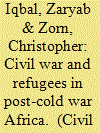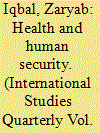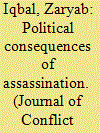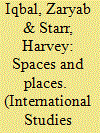|
|
|
Sort Order |
|
|
|
Items / Page
|
|
|
|
|
|
|
| Srl | Item |
| 1 |
ID:
077775


|
|
|
|
|
| Publication |
2007.
|
| Summary/Abstract |
One inevitable by-product of large-scale civil conflict is the displacement of individuals, either voluntarily or by force. That fact has been a cornerstone of the international community's involvement in civil conflicts, which has increased markedly since the end of the Cold War. Yet few studies have investigated empirically the connection between such conflicts and the occurrence and extent of forced migrations, and none have evaluated whether the ongoing international response has been effective in breaking the link between civil war and forced migration. We thus begin with the goal of assessing whether and the extent to which the effect of civil wars on volumes of refugees has declined since the end of the Cold War, chiefly due to international efforts to mitigate the conditions that facilitate civil conflict or enhance its detrimental effects. We present a model of refugee flows that accounts for the influence of spatial, domestic, and international factors on those movements, and which allows for the possibility of both temporal variation in the influence of civil wars on those flows and prospective and retrospective temporal dependence in those flows. We go on to evaluate our expectations empirically, using data on refugee movements in Africa during the period from 1992 to 2000. Our findings suggest that the effect of civil wars on forced migration has been steadily declining during those years, a result consistent with the greater levels of international intervention in those conflicts during the period
|
|
|
|
|
|
|
|
|
|
|
|
|
|
|
|
| 2 |
ID:
073551


|
|
|
|
|
| Publication |
2006.
|
| Summary/Abstract |
The consequences of violent conflict permeate countless aspects of society, and are not limited to the political and economic institutions of a state. The concept of human security extends traditional, state-centric notions of security to include the security and well-being of people that live within states. Adhering to the human security framework, I examine the effect of militarized conflict on the populations of states by evaluating the relationship between war and public health while taking into account relevant political and economic factors, including democracy and wealth. I argue that interstate and intrastate conflict negatively influences the health achievement of states and, therefore, the human security of their populations. I assess this relationship by analyzing data on summary measures of public health in all states between 1999 and 2001. My analysis suggests that the negative effect of war on health is particularly intense in the short term following the onset of a conflict.
|
|
|
|
|
|
|
|
|
|
|
|
|
|
|
|
| 3 |
ID:
082405


|
|
|
|
|
| Publication |
2008.
|
| Summary/Abstract |
The assassination of a political leader is among the highest-profile acts of political violence, and conventional wisdom holds that such events often have substantial political, social, and economic effects on states. We investigate the extent to which the assassination of a head of state affects political stability through an analysis of all assassinations of heads of state between 1952 and 1997. We examine the political consequences of assassination by assessing the levels of political unrest, instability, and civil war in states that experience the assassination of their head of state. Our findings support the existence of an interactive relationship among assassination, leadership succession, and political turmoil: in particular, we find that assassinations' effects on political instability are greatest in systems in which the process of leadership succession is informal and unregulated
|
|
|
|
|
|
|
|
|
|
|
|
|
|
|
|
| 4 |
ID:
137748


|
|
|
|
|
| Summary/Abstract |
The selection of our theme for the International Studies Association's 2014 convention, “Spaces and Places: Geopolitics in an Era of Globalization,” was motivated by the need to indicate, and help to remedy, an imbalance in the intellectual attention devoted to time versus space and to raise the consciousness of scholars across international studies to the relevance of spatiality in its many forms. International relations scholars are keenly aware of the role that temporal dynamics play in international politics, and the influence of temporality is acknowledged in works adhering to a range of methodological traditions. It is important, however, both in refining extant theories of global politics and in developing new theories from evolving realities, to be attentive to the contexts of those theories and the phenomena to which they pertain. Thus, world politics must be contextualized not only in time (across history) but also across space.
|
|
|
|
|
|
|
|
|
|
|
|
|
|
|
|
|
|
|
|
|